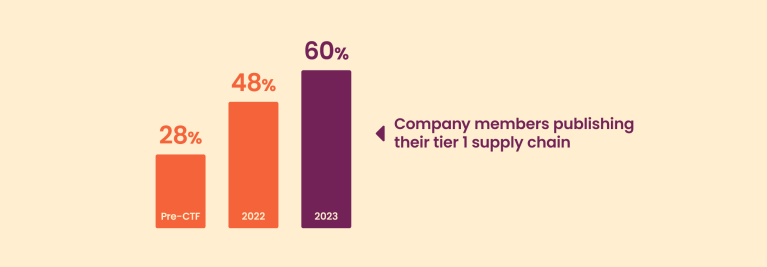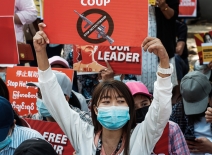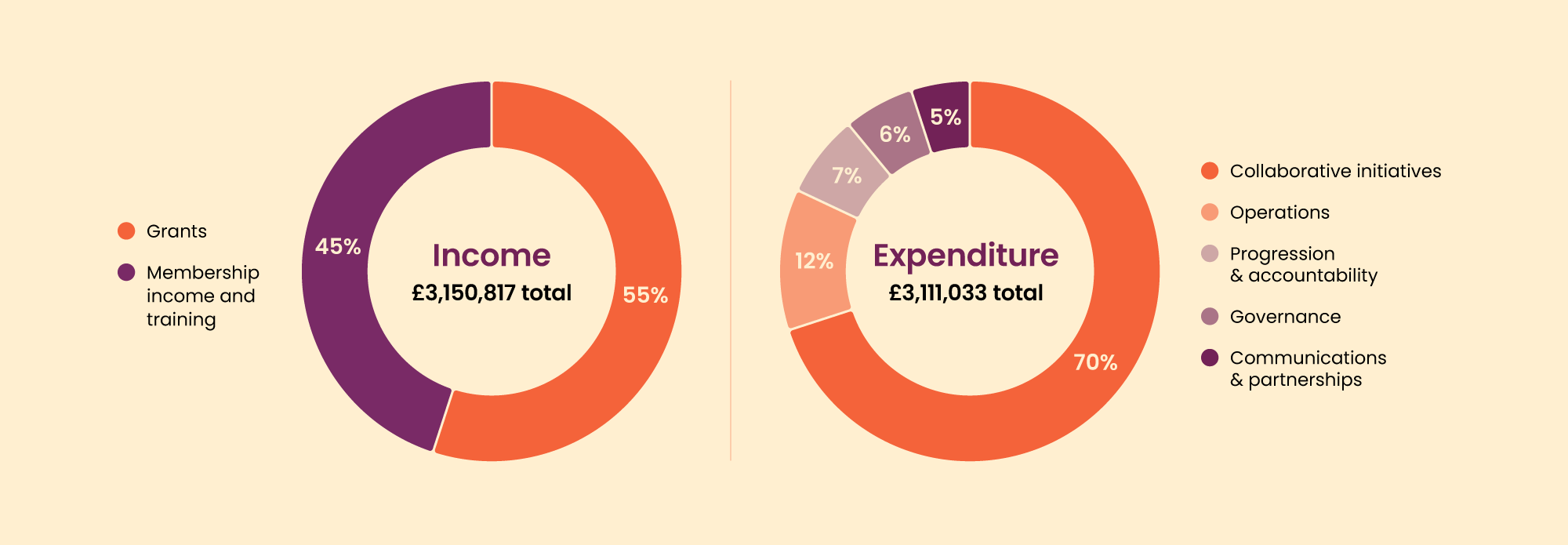The Ethical Trading Initiative is a leading alliance of trade unions, NGOs, and companies, addressing human rights impacts in global supply chains.
From April 2023 to March 2024, we worked to address human rights impacts through three essential pathways as set out in our Theory of Change:
- Driving progression and accountability
- Collaborating for impact
- Facilitating an enabling environment
This work was conducted in line with our mission and vision and guided by the aims and goals we set out in ETI’s Strategy 2026.
Highlights
Our members
Enabling environment
Supply chains don’t exist in isolation – various factors and stakeholders influence the ability of workers to fully exercise their rights. Governments, for example, play a key role in shaping the prevailing regulatory and policy environment, which can in turn be influenced by international conventions, laws, and trade agreements.
2023-24 saw great strides for business and human rights legislation, with the EU’s Corporate Sustainability Due Diligence Directive and Forced Labour Ban placing new obligations on companies in scope. ETI worked independently and with over 45 stakeholders from the business community, financial sector, and trade union movement to advocate for new legislation, collaborating via the STITCH partnership and as part of a wider movement.
We support efforts to establish mandatory human rights due diligence legislation in the UK and will continue advocacy in collaboration with our members and partners to ensure UK business keeps step with global advancements and market competitors.
Progression & accountability
Member progression
ETI enables company members to prepare for new legislation, by implementing a human rights due diligence (HRDD) approach, aligned with the UN Guiding Principles on Business and Human Rights (UNGPs). Company members learn to progress through a framework developed in collaboration with company, NGO, and trade union members, which supports them with practical implementation over two years of foundation membership. As full members, companies progress further by delving into more challenging areas of their due diligence, such as strategy, grievance and remedy, in a peer learning environment.
ETI delivers ‘group progression’ sessions which provide practical advice, tools, and real-life case studies which support company members to implement robust HRDD in line with the UNGPs. Company members join from all sectors, sizes, and maturity levels to learn and share knowledge, with expertise and guidance from ETI’s secretariat, as well as trade union, NGO and other company members. ETI holds members to account on their commitments to continuously improve and implement a HRDD approach through the ETI Member Charter and Corporate Transparency Framework.
We find the progression meetings very useful in ensuring that we are following the correct path and also understanding how both us as a brand and ETI are evolving and staying relevant to current issues that exist.
Adrian Stevenson, River Island
Transparency & accountability
Corporate transparency facilitates accountability and is vital for companies to demonstrate adherence to emerging legislation. Under ETI’s Corporate Transparency Framework (CTF), we require company members to publicly report on their human rights due diligence in line with seven minimum requirements related to their HRDD. We are the first MSI globally to mandate reporting tier one on Open Supply Hub. ETI’s approach supports members to strengthen their transparency and prepare for new legislative requirements.
Sharing our report publicly and being open and honest about the work we are doing has been a very positive experience with no negative risk to our business. Without transparency and focus on highest risks, brands cannot tackle the challenges faced alone.
Openness provides us with the opportunity to work as a community within our industry and across the tripartite ETI organisation, to tackle some of biggest supply chain risks with more impact.
Heidi Harrington -Technical, Ethics & Compliance Manager, Seasalt
The CTF reporting has driven huge progress among ETI company members, from 58% reporting against the minimum requirements in 2020 to 75% in 2023. Not only has it improved the level of transparency, it's also improved members’ understanding of key elements of HRDD including:
- understanding of what a salient risk is
- how to effectively identify risk
- setting out their approach to respecting freedom of association and collective bargaining
- how to mitigate risks in supply chains


Collaborating for impact
ETI’s members act collectively in response to a range of issues. This collective action focuses on our four thematic priorities: Purchasing practices, Just transition, Challenging contexts and Gender, and works to drive positive impact across three sectors: apparel and textiles (A&T), food, farming and fisheries (FFF), and general merchandise (GM).
Responsible purchasing practices
A company’s everyday purchasing practices have a significant influence on the conditions for workers in the supply chain. Short-term planning, last-minute changes in orders, inaccurate forecasting, pricing below production cost, and late payments can all negatively affect the management of orders and the financial stability of suppliers. This, in turn, can lead to issues such as excessive overtime, low wages for workers, and excessive use of temporary labour. These problems can be exacerbated as purchasing practices cascade and pressures compound along the length of the supply chain, increasing the risk of severe exploitation.
ETI works to improve purchasing practices across sectors. In collaboration with partners, we developed the Common Framework for Responsible Purchasing Practices. The framework supports companies to engage with stakeholders and take practical action to implement more responsible purchasing practices (RPP).
Implementing RPP
As of April 2024, 35 company members participate in the Learning and Implementation Community (LIC) - a group of A&T retailers and brands committed to implementing RPPs through shared learning and collaborative problem-solving. Since its establishment the LIC has met 12 times and seen tangible improvements for companies, suppliers and working conditions as a result.
Responding to gendered impacts
People of different genders experience business-related human rights impacts differently. The rights of women and girls are often disproportionately affected by adverse business impacts. HRDD to better understand and respond to these impacts is critical. Through our Gender Data Initiative, ETI has worked collaboratively with industry partners to develop tools that support the effective collection of gender-disaggregated to better inform companies’ implementation of gender-responsive HRDD.
In 2023, Sedex integrated indicators from our joint gender data guidance into their revised Self Assessment Questionnaires (SAQs), facilitating company access to gendered data from over 76,000 supplier sites on the Sedex platform. This has been particularly useful for smaller brands, or brands with limited resources to invest in elaborate data collection exercises.
Just transition
The climate crisis is indisputably a human rights crisis, with major implications for business and workers worldwide. ETI’s just transitions work supports companies to understand and mitigate impact workers’ rights impacts caused or exacerbated by the climate crisis or by a company’s own climate action. Our approach focuses on ensuring and supporting social dialogue with workers and their representatives. ETI Bangladesh have championed this approach in 5 factories across Dhaka and Gazipur districts through the Green Social Dialogue programme, impacting around 10,000 workers.
Crises and challenging contexts
Companies increasingly source from and operate in challenging contexts where risks to workers are heightened: from regions affected by conflict, those witnessing systematic and state-imposed human rights violations, to those exposed to increasing risks of natural disasters. In such contexts, implementing human rights due diligence, protecting workers and sustaining supply chains can prove more difficult and sometimes impossible.
When ETI company member supply chains are exposed to crises, we support our members in their response and provide knowledge, insights and guidance in line with the UNGPs, to help understand the key human rights risks at play, and the heightened human rights due diligence necessary to mitigate them.
In the last year, we monitored and responded to 4 crises, produced 8 resources to guide affected members and industry stakeholders.
We continued to monitor evolving human rights risks in Myanmar, and followed-up with members regarding special measures implemented following ETI's independent evidence-based assessment. In such contexts, both the decision to stay or to leave can have adverse effects. Whatever action is taken, companies must also take steps to mitigate these impacts and prioritise workers in their decision-making processes, as set out in the UNGPs and the OHCHR recommendations.
ETI initiatives
ETI convenes and collaborates with members and partners through initiatives on key human rights issues across global supply chains
ETI’s global presence
ETI and our members have a presence in over 160 countries worldwide, affording us expertise and access to global networks and supply chain insights. We have sister organisations in Denmark, Sweden and Norway, and country offices in Bangladesh and India.
Bangladesh
ETI Bangladesh (BD) works with over 115 factories across the country, reaching more than 260,000 workers and delivering expert training on key topics including occupational health and safety, social dialogue, gender equality and just transition. ETI BD works with ETI company members to drive improvements at country and sector level and advocates for workers’ rights and environmental sustainability across the country’s garment industry.
India
ETI in India works closely with key stakeholders across national apparel, food and stone sectors to address human rights impacts and advocate for national policy on key workers’ rights issues. We hold various partnerships with industry associations, including the Apparel Training and Design Centre, where ETI has contributed to improved understanding and proactive implementation of human rights due diligence strategies and systems in Indian manufacturing. ETI has also supported the revival of local multistakeholder structures like the Tiruppur Stakeholders' Forum in Tamil Nadu.
















